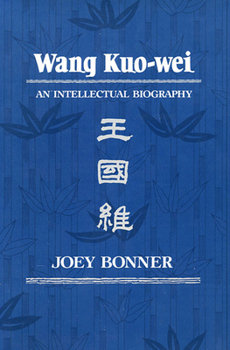Wang Kuo-Wei: An Intellectual Biography
In this first full-fledged intellectual biography of the brilliant and multifaceted Chinese scholar Wang Kuo-wei (1877-1927), Joey Bonner throws important new light on the range and course of ideas in early twentieth-century China. Coincidentally, she illuminates the nature of Wang's intimate, thirty-year personal and professional association with the well-known Chinese scholar Lo Chen-y (1866-1940) and provides a most comprehensive and compelling account of her biographee's posthumously controversial career in the years following the 1911 Revolution.
Pursuing her subject across the whole spectrum of his many scholarly interests, Bonner critically examines Wang's essays on German philosophy and philosophical aesthetics; his poetry, literary criticism, and aesthetic theory; and his works on ancient Chinese history, particularly of the Shang dynasty. Insightfully relating his strenuous intellectual search in the fields of philosophy, literature, and history to his very personal quest for truth, beauty, and virtue, Bonner shows in this finely crafted book how Wang's unhappiness in later life as well as his suicide can be understood only within the context of his humanistic concerns in general and his extreme commitment in the postimperial period to the Confucian ethicoreligious tradition in particular. Without compromising the clearheaded critical detachment that characterizes her analysis of the intricacies of his thought, Bonner has produced a portrait of Wang Kuo-wei suffused with warmth and sympathetic respect.Format:Hardcover
Language:English
ISBN:0674945948
ISBN13:9780674945944
Release Date:April 1986
Publisher:Harvard University Press
Length:314 Pages
Weight:1.60 lbs.
Dimensions:1.3" x 6.6" x 9.5"
Related Subjects
Arts & Literature Asia Authors Biographical Biographies Biographies & History Biography & History China Chinese Criticism & Theory Ethnic & National History History & Criticism Literary Criticism Literary Criticism & Collections Literature & Fiction Middle East Philosophy Politics & Social Sciences Specific Groups Women World World LiteratureCustomer Reviews
0 rating





